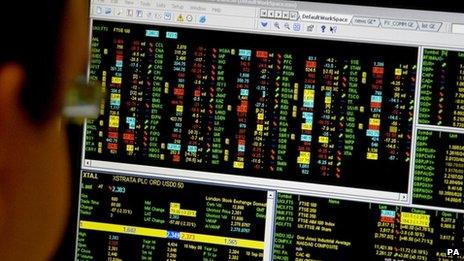New York seeks curbs on high-frequency trading
- Published

There are concerns that certain services provided to them give high-speed traders an unfair advantage
New York's attorney general has called for curbs on services provided to high-frequency traders.
In particular Eric Schneiderman highlighted services that allow traders to get faster access to information.
He said traders can make "rapid and often risk-free trades before the rest of the market can react".
High frequency trading is where firms create sophisticated computer programs to buy and sell stocks in milliseconds, faster than any human.
It has grown in popularity in recent years, but it has also come under scrutiny.
"Rather than curbing the worst threats posed by high-frequency traders, our markets are becoming too focused on catering to them," said Mr Schneiderman.
'Fundamentally unfair'
On Tuesday, Mr Schneiderman raised concerns that firms specialising in high-frequency trading were benefitting from the special services provided by stock exchanges.
He said the services allowed such firm to gain access to key data - including pricing, volume, trade and order confirmation - before other investors, allowing them to take positions in the market accordingly.
"For instance, high-frequency traders look for arbitrage opportunities between and among the various exchanges, moving on price and order information before the rest of the market is even able to digest it," he said.
He added that allowing firms to place their servers on location helped them "to continuously monitor all the exchanges for large incoming orders".
"If a firm can detect a large order from an institutional investor - like a pension fund - it can instantaneously position itself on the other side of the trade, driving up the prices artificially," he said.
"I am committed to cracking down on fundamentally unfair - and potentially illegal - arrangements that give elite groups of traders early access to market-moving information at the expense of the rest of the market."
Growth industry
The call for curbs comes as Virtu, a high-frequency trading firm in New York, is planning to sell shares and become a publicly listed company.
The firm is looking to raise $100m (£60m) via the share sale. Virtu reported profits of $184m in 2013, a 108% increase from 2012.
In its filing with the US regulators, the firm said it has recorded only a single day of trading losses in the past five years.
However, not all firms in the sector have had a smooth ride and there have been concerns over risks associated with such trades.
In 2012, Knight Capital, a New Jersey-based trading firm, lost close to $440m and almost had to file for bankruptcy after a computer glitch caused the firm to execute 150 mistaken orders to the New York Stock Exchange.
In May 2010, computerized trading was blamed for the "flash crash" which briefly sent US markets down 5% before the error was discovered.
The US Commodities Futures Trading Commission (CFTC) recently said it was looking into regulating trading practices at firms, after publishing a report on the industry in September.
- Published11 March 2014
- Published22 July 2013
- Published8 July 2013